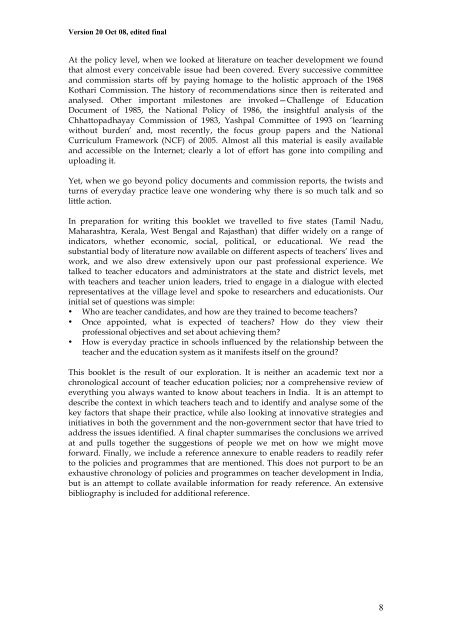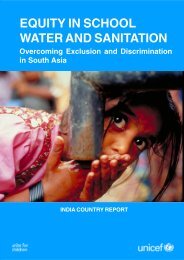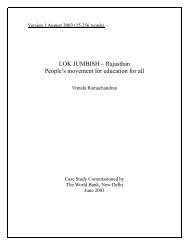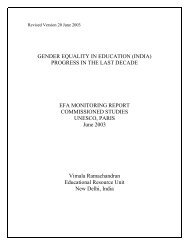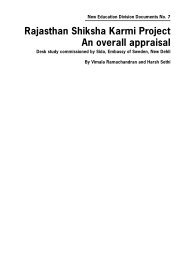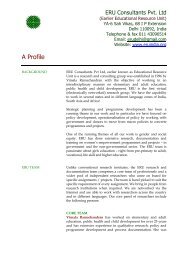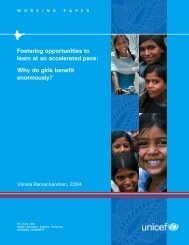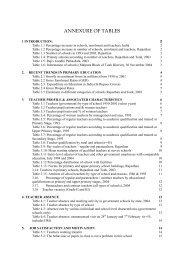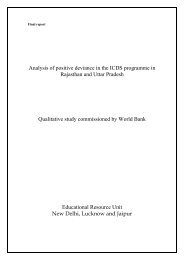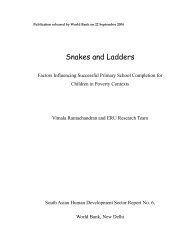primary school teachers the twists and turns of everyday practice
primary school teachers the twists and turns of everyday practice
primary school teachers the twists and turns of everyday practice
Create successful ePaper yourself
Turn your PDF publications into a flip-book with our unique Google optimized e-Paper software.
Version 20 Oct 08, edited final<br />
At <strong>the</strong> policy level, when we looked at literature on teacher development we found<br />
that almost every conceivable issue had been covered. Every successive committee<br />
<strong>and</strong> commission starts <strong>of</strong>f by paying homage to <strong>the</strong> holistic approach <strong>of</strong> <strong>the</strong> 1968<br />
Kothari Commission. The history <strong>of</strong> recommendations since <strong>the</strong>n is reiterated <strong>and</strong><br />
analysed. O<strong>the</strong>r important milestones are invoked—Challenge <strong>of</strong> Education<br />
Document <strong>of</strong> 1985, <strong>the</strong> National Policy <strong>of</strong> 1986, <strong>the</strong> insightful analysis <strong>of</strong> <strong>the</strong><br />
Chhattopadhayay Commission <strong>of</strong> 1983, Yashpal Committee <strong>of</strong> 1993 on ‘learning<br />
without burden’ <strong>and</strong>, most recently, <strong>the</strong> focus group papers <strong>and</strong> <strong>the</strong> National<br />
Curriculum Framework (NCF) <strong>of</strong> 2005. Almost all this material is easily available<br />
<strong>and</strong> accessible on <strong>the</strong> Internet; clearly a lot <strong>of</strong> effort has gone into compiling <strong>and</strong><br />
uploading it.<br />
Yet, when we go beyond policy documents <strong>and</strong> commission reports, <strong>the</strong> <strong>twists</strong> <strong>and</strong><br />
<strong>turns</strong> <strong>of</strong> <strong>everyday</strong> <strong>practice</strong> leave one wondering why <strong>the</strong>re is so much talk <strong>and</strong> so<br />
little action.<br />
In preparation for writing this booklet we travelled to five states (Tamil Nadu,<br />
Maharashtra, Kerala, West Bengal <strong>and</strong> Rajasthan) that differ widely on a range <strong>of</strong><br />
indicators, whe<strong>the</strong>r economic, social, political, or educational. We read <strong>the</strong><br />
substantial body <strong>of</strong> literature now available on different aspects <strong>of</strong> <strong>teachers</strong>’ lives <strong>and</strong><br />
work, <strong>and</strong> we also drew extensively upon our past pr<strong>of</strong>essional experience. We<br />
talked to teacher educators <strong>and</strong> administrators at <strong>the</strong> state <strong>and</strong> district levels, met<br />
with <strong>teachers</strong> <strong>and</strong> teacher union leaders, tried to engage in a dialogue with elected<br />
representatives at <strong>the</strong> village level <strong>and</strong> spoke to researchers <strong>and</strong> educationists. Our<br />
initial set <strong>of</strong> questions was simple:<br />
• Who are teacher c<strong>and</strong>idates, <strong>and</strong> how are <strong>the</strong>y trained to become <strong>teachers</strong>?<br />
• Once appointed, what is expected <strong>of</strong> <strong>teachers</strong>? How do <strong>the</strong>y view <strong>the</strong>ir<br />
pr<strong>of</strong>essional objectives <strong>and</strong> set about achieving <strong>the</strong>m?<br />
• How is <strong>everyday</strong> <strong>practice</strong> in <strong>school</strong>s influenced by <strong>the</strong> relationship between <strong>the</strong><br />
teacher <strong>and</strong> <strong>the</strong> education system as it manifests itself on <strong>the</strong> ground?<br />
This booklet is <strong>the</strong> result <strong>of</strong> our exploration. It is nei<strong>the</strong>r an academic text nor a<br />
chronological account <strong>of</strong> teacher education policies; nor a comprehensive review <strong>of</strong><br />
everything you always wanted to know about <strong>teachers</strong> in India. It is an attempt to<br />
describe <strong>the</strong> context in which <strong>teachers</strong> teach <strong>and</strong> to identify <strong>and</strong> analyse some <strong>of</strong> <strong>the</strong><br />
key factors that shape <strong>the</strong>ir <strong>practice</strong>, while also looking at innovative strategies <strong>and</strong><br />
initiatives in both <strong>the</strong> government <strong>and</strong> <strong>the</strong> non-government sector that have tried to<br />
address <strong>the</strong> issues identified. A final chapter summarises <strong>the</strong> conclusions we arrived<br />
at <strong>and</strong> pulls toge<strong>the</strong>r <strong>the</strong> suggestions <strong>of</strong> people we met on how we might move<br />
forward. Finally, we include a reference annexure to enable readers to readily refer<br />
to <strong>the</strong> policies <strong>and</strong> programmes that are mentioned. This does not purport to be an<br />
exhaustive chronology <strong>of</strong> policies <strong>and</strong> programmes on teacher development in India,<br />
but is an attempt to collate available information for ready reference. An extensive<br />
bibliography is included for additional reference.<br />
8


